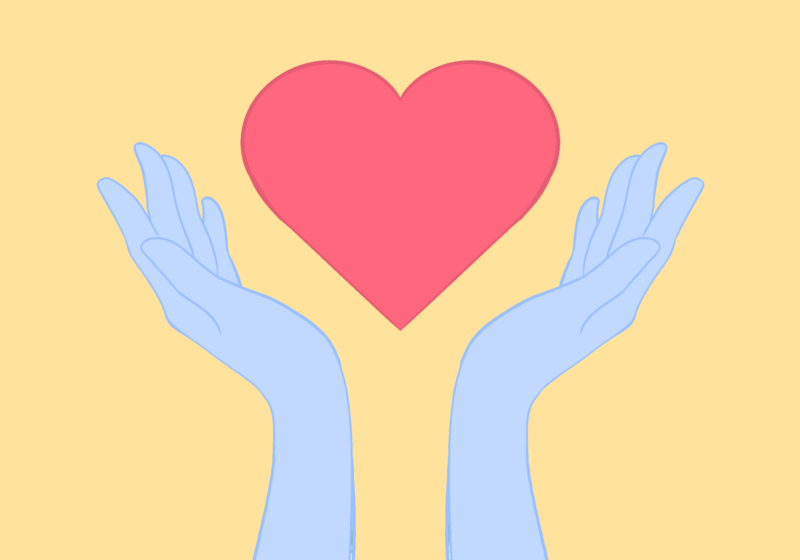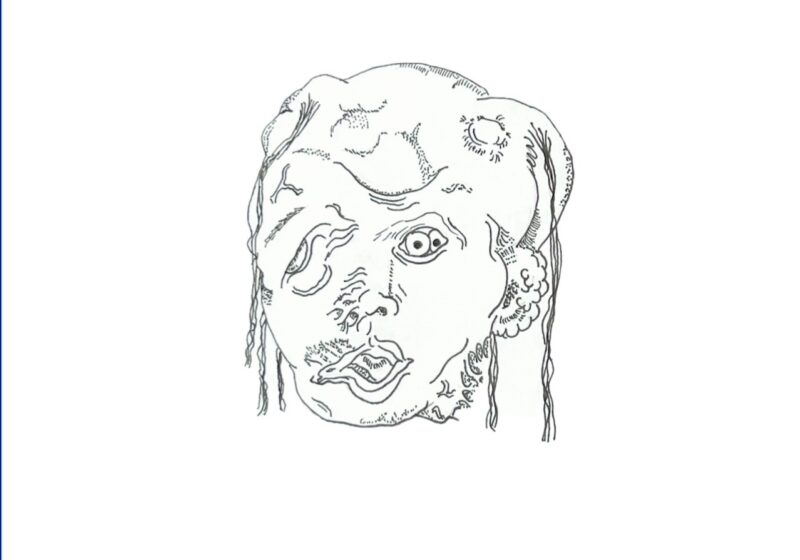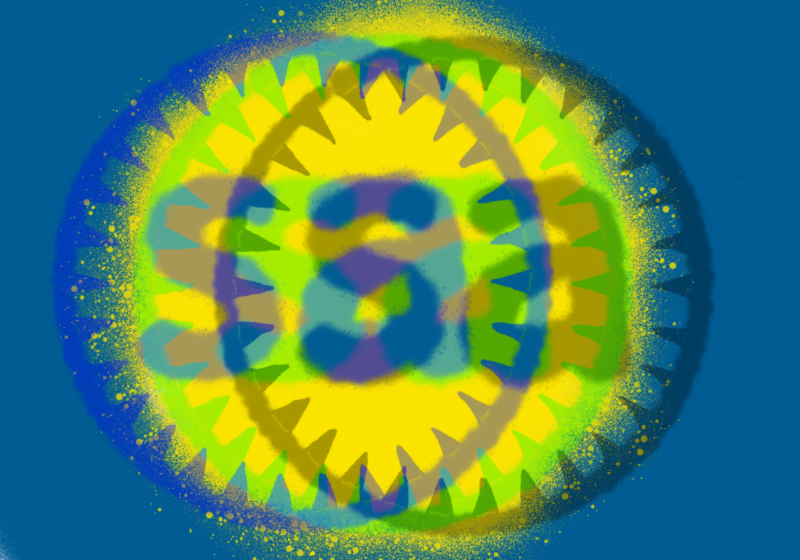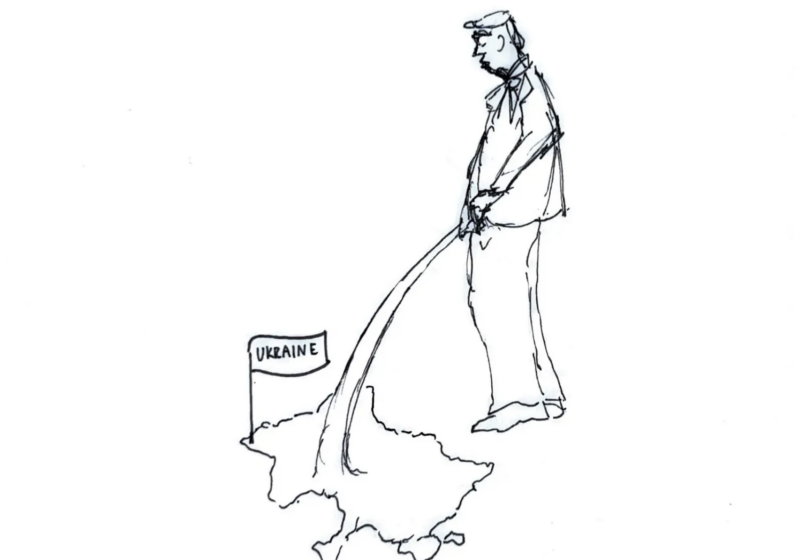It happened while I was sitting in Douggie. Nursing a stale cup of coffee while staring at nothing in particular, my thoughts wandered to a memory once forgotten.
I was sitting on the carpet of my living room with my grandma at the age of seven, struggling to conceal the smirk on my face. She knew what was coming next.
“Go fish!” I said triumphantly, forcing her to dig through the pile of tattered playing cards that lay in the space between us. We played this game every time she came to visit, and every time she let me win. At the time, however, I just thought I had a good poker face.
“Your guardian angel must be watching over you!” she reminded me as she sifted gently through the pile. The thought of having a guardian angel always made me feel safer.
Suddenly, I’m back in the dining hall, and all I can see is this single sheet of paper right behind the workers’ counter. It’s just hiding there in plain sight, resigned to the bustling employees who only offer it a subtle breeze as they rush to feed the ever-growing line of hungry students. I didn’t dare look away from it. I couldn’t because I knew the second I did, I would burst into tears.
By the time my grandma passed away, we had drifted apart. Yet the tears flowing down my face as I rushed back to my dorm room betrayed my assumption that this pain had been processed. Why was this coming up now? I knew it wasn’t the memory in isolation that evoked these feelings. It was as though my memory had smuggled with it a thought that recontextualized my perspective of the experience. That the person with whom I shared it — someone I suddenly and consciously recognized I loved unconditionally — had drifted from my life a long time ago, and was now gone forever.
By the time I made it back to my dorm room I was a puddle on the floor. I remembered the time my grandma let me arm wrestle her when I was 10. I remembered making her omelets in the morning when she came to visit. I remembered naively asking her if people “back in her day” could only see things in black and white like the old movies. I remembered how that made her laugh. But then I remembered avoiding her after I got into a fight with my mom because I thought she was mad at me too. I remembered declining her invitation to watch a movie because I didn’t want her to know I was under the influence. I remembered faking a smile while making small talk with her the day I realized I hated myself. I remembered it all.
I couldn’t escape reflection as I processed my grief. To me the concept of loving myself was always foreign because I had always implicitly believed self-worth to be a commodity I needed to earn. We live in a society that doesn’t teach us the vital need for self-compassion and the role that close relationships play in a fulfilling life. Instead, we are taught that overworking and career-building are central to the human experience. We are a culture that encourages self-criticism and ostracizes self-love, manifested in our compulsive need to measure ourselves relative to our peers. Generation Z is operating as a litmus test for these increasingly normalized trends.
Upwards of 70% of teenagers 13-17 view depression and anxiety as a “major problem”, according to Pew Research Center. Suicide is the second leading cause of death for individuals between 10-14 according to the National Institute of Mental Health. 79% of Generation Z reports feeling lonely, double that of seniors aged 66 or older. This is not normal. These climbing rates of disorder are operating within a broader, rapidly changing social context. We yell at each other in 280 characters. We compare ourselves to others’ social media feeds. We feel pressured to present ourselves perfectly online and in our professional and academic lives. We’re inundated with media that fetishizes unrealistic ideals of a “good life”. The average member of Gen Z watches 7.2 hours of video per day. That’s 2628 hours per year.
I sat down at my desk and wiped the tears away as they ran down my face. I knew I had to do something. The thought of not acting — not reaching for my grandma — was too painful to bear. With time interminably dragging me farther from her living body, I figured the closest thing to seeing her again was to write her a letter.
My hands hovered above the keyboard. “This is ridiculous,” I thought to myself. I felt like a madman about to engage in conversation with a wall. I clattered the first two words, “Dear Grandma.” I started writing about how much I loved her, how much I missed her, and how I wished we could be together again. I stopped to consider the words on the page. They could have been printed on a Hallmark card. My soul was wailing, but my fingers were on the other side of the abyss, barely hearing a whisper. I had to make the jump. I had to be honest with myself.
“As I got older, I lost myself. I felt that when you came to visit, I had to prove to you that I was becoming a strong and mature young man. That somehow your love for me was conditional. I wish I would have opened up to you. I wish I would have told you how terrified I was of the world, of my family, of the people I went to school with. I wish we could have stayed friends as I grew up.” Cool tears trailed my cheeks as the words flowed onto the page.
“At times like these I really wish that there was a God. That somehow, some way, you’re looking down on me now as I write this in a puddle of my own tears and you’re feeling the same sense of connection that I feel to you now. If I have a guardian angel, I know it’s you. I never really got to say goodbye to you. In many ways I never had the opportunity to say hello. Words can’t describe how badly I want to hug you right now. Wherever you are right now, even if that place is nowhere, I want you to know that I love you so much. I never got to say that to you in the way that I mean it now.”
The dull rattle of my box fan reminded me that the world was still spinning. I read the words over and over, as if to retell myself their contents were true. The desire to see my grandma once more, to hear her voice, was only strengthened through writing and with it the torment of knowing I couldn’t. But my feelings of loss were no longer shapeless. I was now overwhelmed with a profound sense that there was tragic beauty — a necessity — to my pain. Something that makes us inescapably human.
Grief is a fickle thing. One second, you feel fine, and the next it pierces the fibers of your soul with such precision you don’t know if you’re terrified or grateful of the feelings it elicits. It’s when we lose those we love that we feel the most connected to them. This sense of connection defines grief’s heavy touch. But it’s through this same pain that we find depths of gratitude for the opportunities we have to experience and share love. Our time on this Earth is finite. How we spend it, and with whom we spend it, are ultimately the only things that matter.
Now more than ever our personal narratives are being conditioned by the opinions and beliefs of others. Nobody is born disliking themselves. Nobody wants to feel like they aren’t good enough. These beliefs are learned, taught to us by a broken culture. To fight against this isn’t a function of external battle; it is a matter of internal reflection. We don’t have to be the co-authors in the stories others write about us. We can learn to love ourselves unconditionally, and we can forge deeper bonds because of it. This is where our power lies, if only we choose to search for it.






